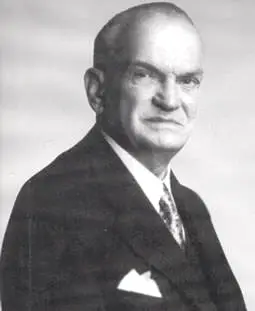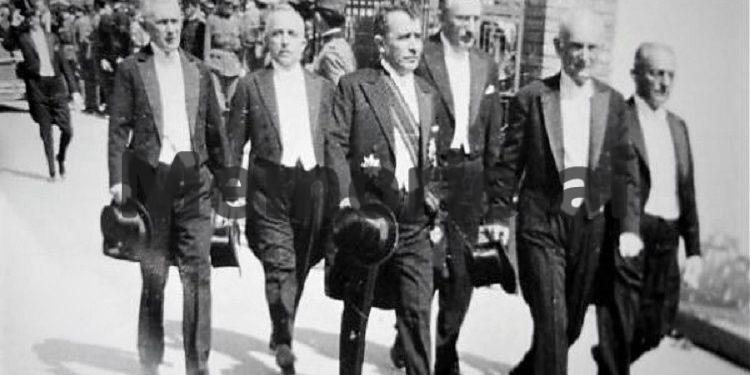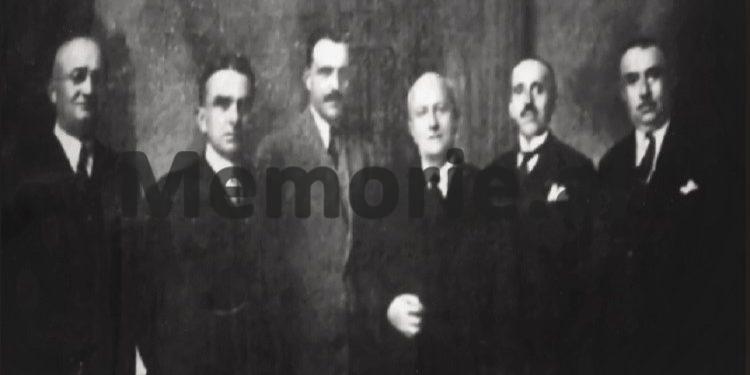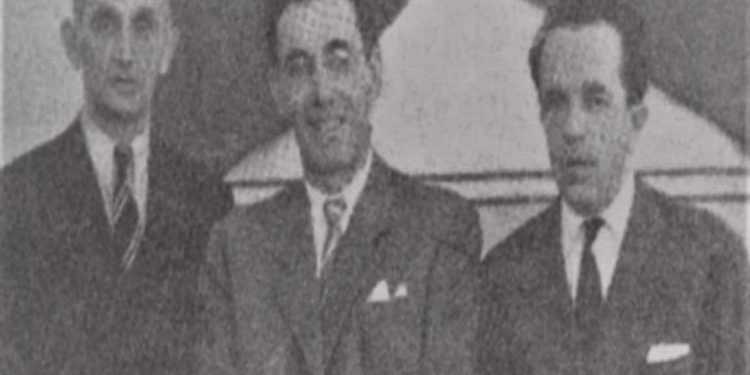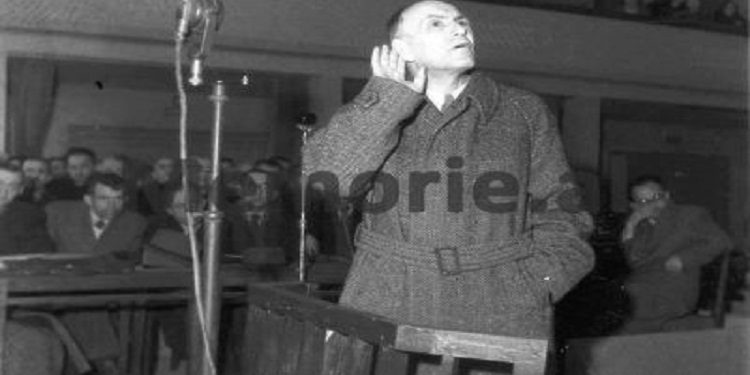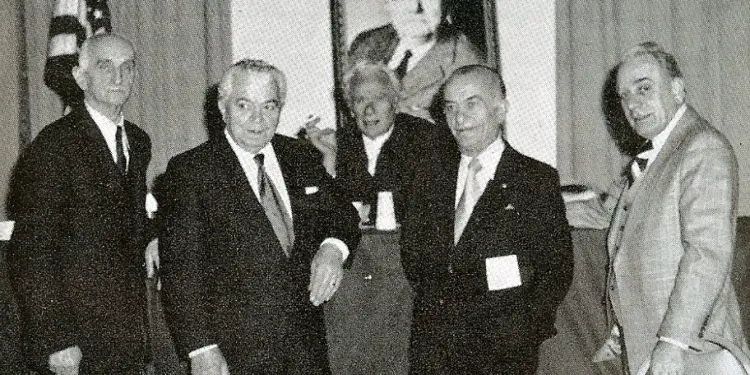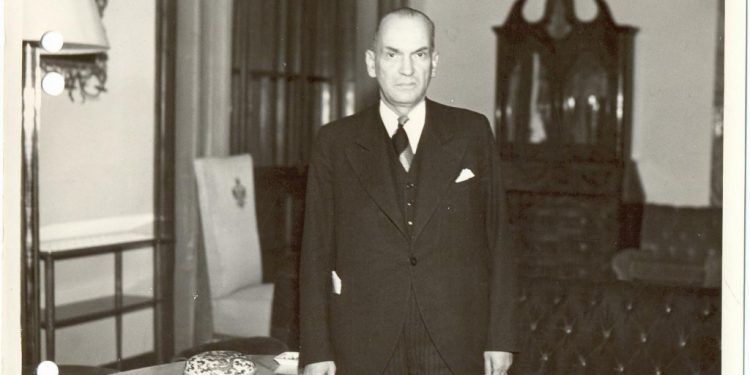By Fazli Hajrizi
Second part
Memorie.al / Rexhep Mitrovica, is a major, complex and dramatic figure, a fighter from the first hours for the creation of ethnic Albania, an outstanding and special personality of the fight for freedom, democracy and national unity, a true intellectual, leader and educator, participant in the Assembly of Vlora on November 28, 1912, in the act of the Declaration of Independence of Albania, deputy of Peja and Gjakova in the Albanian Parliament, Minister of Education (1922-1924), reformer of national education, chairman of the organization “Lidhja Albanian People” based in Mitrovica, chairman of the Central Committee of the Second League of Prizren, and Prime Minister of Albania.
After the capitulation of Italy, on September 8, 1943, the German troops of the XXI and XXII Corps were deployed in Albania. The Germans honored the liberated, independent and free Albania, declaring themselves guarantors of its independence.
Rexhep Mitrovica, first chairman of the Central Committee of the II League of Prizren
The Provisional Executive Committee, on September 11, 1943, re-declared independence. Ibrahim Biçaku, the son of Aqif Pasha Elbasani, was appointed at the head of this Committee. At this time, Xhafer Deva immediately traveled to Tirana, with a defined purpose, to liberate from the Porto-Romano camp near Durrës, some well-known leaders, such as; Mehdi Frashërin, Rexhep Mitrovica, Bedri Pejanin, Dr. Jelal Mitrovica, etc. After the release, on September 13, 1943, these personalities formed a delegation to talk on behalf of Kosovo, with the distinguished representatives of Albania in 1913. The group of 22 people was formed, which immediately entered into talks with the all-powerful representative of the German state, Dr. Herman Neubacher (Neubacher).
Albanian nationalists aspired to preserve the unity of all Albanian provinces. For this reason, they organized themselves politically, to realize the national goals. Seeing that the Albanian population in some parts of Kosovo, especially in its north, was being seriously threatened by the attacks of the Serbo-Montenegro nationalist Chetniks and the Serbo-Montenegro-Macedonian communist gangs, with the initiative of Xhafer Deva, Asllan Boletini and Bedri Gjinaj, that the three from Mitrovica, then Musa Shehu, Sheh Hasan, Lukë Simon Mjeda, Pjetër Vuçaj from Prizren, Tahir Zajmit from Gjakova, Qazim Bllacë from Suhareka, etc., there was a need to hold a meeting in Prizren and choose a The Executive Council, which would take care of the government of the country temporarily until the formation of a government body, which would emerge from the general will of the people.
This meeting, according to them, will be in the spirit of the Albanian League of Prizren and will be called the Second League of Prizren. The meeting was held on September 16, 1943. The assembly was unanimously baptized: “The Second Connection of Prizren”. The chairmanship was elected in the composition of: Musa Shehu (chairman), Aqif Bluta (vice-chairman), Rexhep Krasniqi (vice-chairman) and Bedri Gjinaj (secretary).
In the assembly, there was a discussion about the issue of declaring the will of the people, for the union of the provinces of Kosovo, Dibra, Struga, Ulcinj and Tuzi, with the Albanian state, for the union of the prefecture of Mitrovica with Albania, since it is with the sub-prefectures of Vushtrri, Podujeva and New Pazars were under the German occupation and were administratively part of the Serbian state; for the military organization of the people and the preparation of the defense of the ethnic borders; for the creation of a Central Committee, with headquarters in Prizren and sub-committees in all the centers of freed lands, to direct the necessary activity of governance and defense of the country; for the compilation and approval of the Constitution of the National organization, the Second League of Prizren, etc.
On the second day, that is on September 18, 1943, Rexhep Mitrovica, Bedri Pejani, Xhafer Deva and Xhelal Mitrovica entered the hall of the “Bajram Curri” primary school, where the assembly of the Second League of Prizren was held. Upon entering the hall, the delegates rose to their feet and greeted them with applause, calling their names in turn. Rexhep Mitrovica, moved by the festive atmosphere that reigned in the city, and especially in the hall decorated with national flags and photos of national personalities, in his discussion before the delegates, among other things, asked to be given great importance, two main points, such as: “The military organization for the defense of the country against any eventual massacre of the population by subversive gangs, the registration of the population of Kosovo, which until now has been neglected by our governments”.
Rexhep Mitrovica, explains at length the role he would play in the Peace Conference, the registration and the documents that prove that Kosovo is Albanian. He appeals especially to the teachers for the implementation of the population census: “We must give way to work, and not to dry words, if we want to live as a state, as a nation, or as a person. It requires great care and needs to pour a lot of effort in collecting documents that are related to the interest of our common life. The end of the war should find us completely compact with all the necessary preparations, to face any threat or political intrigue, which may require the securing of our eternal freedom”.
This fiery speech, which was greeted warmly by the delegates, his earlier rather prosperous activity, the sufferings he experienced in Porto-Romano, etc., were the reasons that pushed the delegates, on September 23, 1943, to elect him chairman of the Central Committee. to give him the confidence to lead the Second League of Prizren. The leadership of the Central Committee consisted of seven people. This Central Committee was first chaired by Rexhep Mitrovica (September 18–26, 1943), secondly, by the scholar and politician Bedri Pejani (October 12, 1943–July 26, 1944), and finally, by the polyglot intellectual, Xhafer Deva (end of July 1944–19 November 1944). The Central Committee, under the leadership of Rexhep Mitrovica, organized the central committees of the prefectures of Prizren, Peja, Mitrovica, as well as some district committees in the sub-prefectures.
The Second League of Prizren, headed by the Executive Committee elected by the Assembly of September 1943, set about the work of organizing the war against the Scat in cooperation with the government of Tirana, which had become a national government since the annexation of Albania by Fascist Italy ended. . The Executive Committee of the Second League of Prizren in Kosovo performed the duties of the government, in close cooperation with the officials appointed by the government of Tirana.
Prime Minister Rexhep Mitrovica and his government
Rexhep Mitrovica and his friends created ethnic Albania, declared its independence and neutrality. On September 14, 1943, in Tirana, a provisional council of 22 people was formed, which quickly elected a Provisional Executive Committee of seven people, headed by Ibrahim Biçaku. This Provisional Executive Committee would direct the affairs of the state, until the formation of a legal government, would make a public announcement about the situation in Albania, recognized by Berlin, as an independent state, would take measures to bring order and peace in the capital and, in other countries, will accept the resignation of the government of the time headed by Eqrem Libohova, will affect the release of two thousand political prisoners, who were held in the Porto-Romano camp in Durrës, etc.
Berlin accepted the government, did not take measures to impose a military administration, which usually characterizes foreign rule and occupation, in time of war. The German military security bodies continued to maintain a stance of non-interference in Albanian internal affairs. The German invaders failed to use the products of the Albanian economy. Thanks to the agricultural-livestock wealth of Kosovo, in Albania, there was an extraordinary abundance of foodstuffs and industrial goods. The German soldiers were forced to buy goods in the Albanian market, with Albanian francs.
Proclamation of the Regency Council
On October 16, 1943, the National Assembly met in Tirana, which announced the “Supreme Council of the Regency”, composed of; Mehdi Frashëri, Fuad Dibra, Anton Harapi, Lef Nosi and on November 5, 1943, the Regency appointed the government, with Prime Minister Rexhep Mitrovica, who was also entrusted with the task of Minister of Popular Culture. The General National Assembly, which consisted of representatives of all the provinces of Albania and those beyond the borders of 1913, i.e. never in Albanian history, had it been represented by all the provinces that speak the Albanian language, proclaimed the independence of Albania and the neutrality of her.
The cooperation of the prime minister with the German general, for South-Eastern Europe, Neubacher, initially gave satisfactory results for overcoming the many difficulties that the Albanian people were facing. Former deputy of the first Albanian democratic parliament, former Minister of Education, participant in the act of the Declaration of Independence of Albania, first chairman of the Albanian People’s League in Mitrovica, first chairman of the Central Committee of the Second League of Prizren, nationalist and the outstanding personality of Albanian education and culture, who was often sacrificed to serve the critical moment, in which the nation was passing, Rexhep Mitrovica, formed his cabinet, which was composed of many personalities with high school education, which were not tools of a foreign power, with this formation:
Rrok Kolaj, Minister of Justice, Xhafer Deva, Minister of Internal Affairs (September 1943-June 1944), Ago Agaj, Minister of Economy, Sokrat Dodbiba, Minister of Finance, Musa Gjylbegaj, Minister of Education, Kole Tromara, Minister of Culture of Propaganda, Eqrem Çabej, Minister of Education, Bahri Omari, Minister of Foreign Affairs, Vehbi Frashëri, Qazim Bllaca and Ernest Çoba – undersecretaries of state. His government had under its administration, most of Kosovo united with Albania. It did not have the representation of any political force, or the consensus of the main political forces, which dominated the war scene in Albania, on the contrary, it represented the Albanian nation, up to Mitrovica, it was supported within the country and it promised to ensure normality under conditions of occupation, in order that Albania would not be destroyed by the war.
The Communist Party denounced the government of Rexhep Mitrovica, calling it; “collaborationist government, Nazi puppet government, traitor of national ideals”, etc. The fire of the fratricidal war was burning and Dushan Mugosha and Miladin Popovici were fanning it more, through some Albanian communists. The Central Committee of the Yugoslav Communist Party, in a letter it sent to the Albanian communists, led by Dushan Mugosha and Enver Hoxha, among others, cynically stated: “Raising the issue of the union of Kosovo with Albania, means you shake hands with various reactionaries, including the enemy himself…! The new Yugoslavia that is being built will be a country of free nations and, therefore, there will be no place for national oppression of Albanian minorities”. (Reginald Hilbert, book Bitter Victory, p.12).
Resignation and departure to Kosovo
Rexhep Mitrovica, seeing that his government was not succeeding in maintaining normality and neutrality, was not achieving national understanding, nor was it able to save the Albanian nation from the massacre and the country from the civil war, seeing that the communists were blinded to that extent, when the fratricidal war will begin, not wanting to be an accomplice in the crime and, responsible before history, decided to resign. After various political manipulations, sabotages that were carried out for the formation of a strong government, for its consolidation, together with Xhafer Deva and the Kosovar group, he saw no reason to return to Prizren, in order to protect Kosovo, to it had already become a point of concentrated Serbo-Montenegro, Chetnik and communist attacks.
Rexhep Mitrovica, stayed for a while in Prizren and then visited several other centers of Kosovo, such as; Gjilan, Peja and Mitrovica. In mid-November 1944, due to the circumstances of the world war, the Second League of Prizren was forced to suspend its activities in the homeland, to continue its mission in exile. Before leaving, the Central Committee invited a meeting attended by: Musa Shehu, Sheh Hasani, Jonuz Shahsivari, Lukë Simon Mjeda, Ahmet Suhareka, Kemal Karahoda, Pjetër Vuçaj, lawyer Esat Berisha, lawyer Sokol Dobroshi, Dr. Xheladin Deda, Dr. Durmish Prizren, etc. A temporary commission was formed to ensure peace in the city. The will and conviction of some was expressed that, for many reasons, the members of the Central Committee will leave Kosovo, to continue the efforts for the freedom of the Albanian population of Kosovo, in exile.
Before leaving Prizren, the representatives of the Central Committee composed of: Ing. Xhafer Deva, Rexhep Mitrovica, Rexhep Krasniqi, Tahir Zajmi and Xhelal Mitrovica, who nominally represented the High Council of the Regency in Kosovo, in the hope of the expected landing of the western allies in the Balkans, had tasked a well-known Albanian intellectual with the task of to travel to Skopje and Thessaloniki, to present to the Western Allied Command, a memorandum in French, which briefly explained the historical reasons for the war of defense of the Albanian population, against the foreign and imposed rule of Serbia and the desire of the people of Kosovo, to decide for themselves, to be an integral part of the Albanian state.
The Albanian people never felt more secure than during the government of Rexhep Mitrovica. National unity was achieved during the stormy world war. The people called this period; “Time of Albania”. The American ambassador, near the government of Greece, in Cairo, in July 1944, writes that; “The government of Rexhep Mitrovica is composed of people who in the past enjoyed respect in the country and some of them are considered to be the best people who came out of the Gulf of Albania. Most of them are not known as ardent pro-Germans, nor as political fascists.
Some, indeed, were friends of England and America. It is not wrong to say that they were against Italian domination. As far as personal honesty can take it, they are the people with the highest qualities, of all those governments that Albania has ever had. However, these people accepted German rule and sided with Germany. The reason was probably that they sincerely followed Chamberlain’s policy. They try at all costs to remain neutral. They hope to unite the entire Albanian nation, both in Albania and in Yugoslavia, in a compact part, which could be approved by the supporters, whoever they might be (Germans or allies)”.
‘Special Trial’, activity across Europe
In the special trial that was held in Tirana, in February-March 1945, Bahri Omari declares: “The government of Rexhep Mitrovica, where I participated, had proclaimed Albanian independence and neutrality. This fact was also confirmed by the allied general, Sir Wilson, in a proclamation, in which he said that the position of the Albanian government is accepted, on the condition that it does not give aid to the Germans and, in the event that an act of collaboration with the Germans is found, then the declaration of neutrality had no value.
We had no intention of collaborating with the Germans, because we did not want to be collaborators with the Germans at all, but it was only a transaction, our attitude towards the Germans. The government, in which I was a part, did not give help to the Germans. We stopped the Germans from putting their currency into circulation and for many things, we have been in opposition; until in the end we all resigned, in May 1944”. (Order Archive, Special Trial, Testimony of Bahri Omar).
The Minister of Finance, Sokrat Dodbiba, also emphasizes that; The government of Rexhep Mitrovica has not been quisling. He declares that the massacre of February 4, 1944, where 84 citizens were killed and many others were injured, was not the fault of Rexhep Mitrovica, nor the Minister of Internal Affairs, Xhafer Deva, but was the work of Kadri Cakran, Xelal Staravecka and Irfan Ohrid, operating under German occupation authority.
Kolë Tromara, also a minister in the Government of Rexhep Mitrovica, although under tremendous spiritual and physical pressure, under inhumane pressure and the threat of capital punishment, declares: “The Government of Rexhep Mitrovica, in which I have participated, has been, as it was possible, independent under an occupation, as we were. For me, the Government of Rexhep Mitrovica has not been quisling, because we did not think of doing things contrary to the interest of the people, as much as they could, during the occupation”. In the middle of November 1944, the group of Kosovars; Rexhep Mitrovica, Xhafer Deva, Tahir Zajmi, Xelal Mitrovica and Rexhep Krasniqi, took the path of exile. After handing over the financial situation, the intact treasure, which was in the coffers of League II of Prizren, on November 15, they left Prizren through Pristina, through the roar of bombings and furious attacks on this city, they stopped for a while in Mitrovica, to continue the road towards Kraleva. The departure was postponed until the late hours, due to the absence of Rexhep Mitrovica, who met with the leaders of Shala.
They traveled in Xhafer Deva’s personal car, and then by plane to Zagreb. There they were welcomed by the president of the Croatian state, Ante Pavelic, and the Croatian foreign minister, who was Bosnian. These Kosovars, who stayed two weeks in Zagreb, together with some other compatriots, commemorated the national holiday of November 28. At the beginning of December, after great efforts and vicissitudes, these nationalists crossed the Slovenian-Austrian Alps and settled in Vienna, where there were also other nationalist groups, with Gjon Marka Gjoni, Nuredin bey Vlora, Shefqet Vërlacin, Mehdi Frashëri and their families. , etc.
The houses where Mehdi Frashëri, Rexhep Mitrovica and Xhafer Deva lived became centers serving all Albanian immigrants. Rexhep Mitrovica, who had delicate health, was forced to be admitted to the sanatorium near the town of Feldkireh, near the Swiss border. During the period 1945-1947, Xhafer Deva stayed in western Austria. In the summer of this year, he, together with Xelal Mitrovica, Tahir Zajmi and Ali Draga, went to Italy. Rexhep Mitrovica, improved, was also drawn from there. They settled in Genoa, Italy and after two months, with the help of a Turkish deputy (of Albanian origin) from Prizren, a personal friend of Xhafer Deva, they secured permission to go to Turkey.
At the end of 1947, Xhafer Deva, Rexhep Krasniqi, Tahir Zajmi and Xelal Mitrovica, emigrated to Syria. They were constantly in touch with Rexhep Mitrovica, who in Ankara, Istanbul and other cities, was surrounded by the honor and respect of many compatriots there. On December 3, 1948, in Istanbul, the Albanian Committee was formed. There, Rexhep Mitrovica met Mit’hat Frashëri and they talked about the idea of establishing a national committee, which would have a western orientation and the support of the USA, England and France. Mit´hat Frashëri asked Rexhep Mitrovica to make an effort to also recreate a committee for Kosovo.He asked to send two representatives of the Kosovo Committee to the “Free Albania” committee. In a letter that he sends to Luan Gashi, Rexhep Mitrovica, among other things, writes: “You saw our deplorable state for not acting positively for Kosovo, I decided that at this age, I might enter the activity for the last time, if I would find some support from any Kosovar group. The arrival of Mid’hat in Istanbul had strengthened this desire. Checking our political ties that we had with Mid’hat, since we found them agreeable, we agreed to revive a serious activity, for the benefit of ethnic Albania, by creating a Kosovo committee. Mid’hat Frashëri demanded that this committee be led by me and promised to support me. I decided to enter this dance, after consulting the Kosovars”.
Rexhep Mitrovica, co-founder of the Second League of Prizren, thinks that Xhelal Mitrovica and Rexhep Krasniqi, two university boys, “at least, will give me the same right that Mid’hat Frashëri had given me. Let’s all try together, take care of them, because they are two intellectual powers of Kosovo that should not be neglected, they should not be allowed to take any other path than ours, let alone remain under the influence of the people of dark. To me, continues Rexhep Mitrovica, is the duty of the old man, who has no other ambition, except to gather the boys in one hearth. Yours, that of brotherhood belongs to you. I am of your opinion, therefore, to enter into an exchange of letters with them, to bring them closer, so that we can be united for the good of Kosovo”!
Often in meetings with compatriots in Turkey and with others who came to meet him, Rexhep Mitrovica, said that Albania as a state exists, however, since it is led by communists, it will not have a long life, so it will not to be sure. The people will not enjoy freedom and well-being, because there can be no Albania without ethnic Albania. With arguments, he denounced the short-sighted policy of Enver Hoxha and the intriguing policy of Tito, towards the Albanians of Kosovo. Even though he was aware of the great danger of the red plague, Rexhep Mitrovica never lost hope in his countrymen, especially in the youth of Kosovo. He lived and worked quietly, inclined to ethnic Albania, until the last moments when he closed his eyes in 1960.
The press of the time in Albania, Kosovo and Yugoslavia announced his death, using the most derogatory words. He was called: “fascist, traitor, criminal”, etc. According to the criteria of Western democracies, it has not been proven that Rexhep Mitrovica, Xhafer Deva, or any other Albanian nationalist, were war criminals. In countries where their regimes are known for genuine democracy, they were warmly received, surrounded by the respect of the people and performed work with great responsibility. If it had been proven that they are war criminals, supporters of fascism, etc., then none of them would be allowed to stay for a moment in the most democratic countries of the world. Memorie.al




